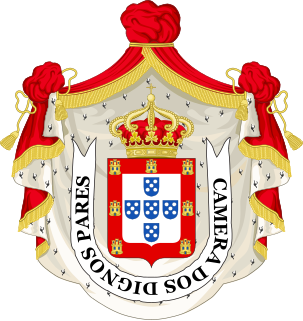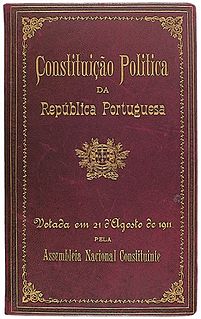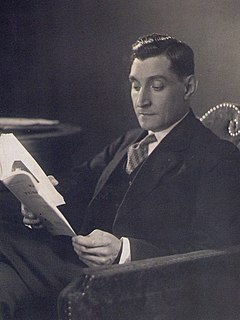 W
WThe Government of Portugal is one of the four sovereignty bodies of the Portuguese Republic, together with the President of the Republic, the Assembly of the Republic and the courts. It is both the body of sovereignty that conducts the general politics of the country and the superior body of the Portuguese public administration.
 W
WThe Assembly of the Republic is the parliament of Portugal. According to the Constitution of Portugal, the unicameral parliament "is the representative assembly of all Portuguese citizens." The constitution names the assembly as one of the country's organs of supreme authority.
 W
WThe two Autonomous Regions of Portugal are the Azores and Madeira. Together with Continental Portugal, they form the whole of the Portuguese Republic.
 W
WBilhete de Identidade, officially the Bilhete de Identidade de Cidadão Nacional, commonly abbreviated as BI, is the national identity card of Portugal. BI's are valid for five years from date of issue for people under the age of 25, and then for ten years, and can be renewed 6 months before expiry. It is mandatory for all citizens above the age of 10, and available optionally for children.
 W
WAníbal Cavaco Silva served as Prime Minister of Portugal from November 1985 to October 1995. He became Prime Minister after serving as President of the Conservative Social Democratic Party (PSD) since May 1985. For almost all of his 10 years as Prime Minister, Cavaco Silva ruled in cohabitation with President Mário Soares. The 10-year period during which Cavaco Silva led the government is often dubbed Cavaquismo in Portuguese, which could be translated as Cavacoism.
 W
WThe Chamber of Deputies of Portugal, alternatively translatable as the House of Commons and formally styled the Chamber of the Gentlemen Deputies of the Portuguese Nation was the lower house of the Cortes Gerais, the legislature of the Kingdom of Portugal during most of the constitutional monarchy period. The Chamber of Deputies directly represented the Portuguese Nation, elected through direct suffrage of the electoral circuits corresponding to the districts of Portugal. During the First Republic, the Chamber of Deputies was remodeled after the US House of Representatives.
 W
WThe Chamber of Deputies of the Portuguese Republic, alternatively translatable as the House of Representatives, was the lower house of the Congress of the Republic, the legislature of the First Portuguese Republic. The Chamber of Deputies was elected for a three-year term and had the power to lay taxes, Initiate Constitutional Amendments and Legislation regarding the Armed Forces, debate on bills proposed by the Executive, and decide on the extension of the legislative term.
 W
WThe Chamber of Peers of Portugal, alternatively translatable as the House of Lords and formally styled the Chamber of the Most Worthy Peers of the Realm, was the upper house of the Cortes Gerais, the legislature of the Kingdom of Portugal during most of the constitutional monarchy period. Members of the Chamber were Peers of the Realm, appointed directly at the pleasure of the Portuguese monarch.
 W
WThe Citizen Card or CC is an identity card issued by the Portuguese government to its citizens. The card replaces several previous documents, including the Bilhete de Identidade, Social Security card, National Health Service card, Taxpayer card and voter registration card, in one secure card. The Citizen Card was first issued in the Azores in mid-2006.
 W
WThe Constitution of Portugal of 1911 was the fourth constitution of Portugal and the first Republican constitution of the Country.
 W
WThe Charter of 1826 or Carta Constitucional, often simply referred to as the Carta, was the second constitution in Portuguese history. It was given to the country in 1826 by King Dom Pedro IV.
 W
WThe Cortes Gerais were the legislature of the Kingdom of Portugal during the Constitutional Monarchy period. The Cortes were established by provision of the 1822 Portuguese Constitution as a unicameral parliament. However, the Constitutional Charter of 1826 reformed the Cortes as a bicameral legislature, with the Chamber of Most Worthy Peers of the Kingdom as its upper house and the Chamber of Gentlemen Deputies of the Portuguese Nation as its lower house.
 W
WThe Council of Ministers is a collegial executive body within the Government of Portugal. It is presided over by the Prime Minister, but the President of Portugal can take on this role at the Prime Minister's request. All senior ministers are members of the Council of Ministers, and when the prime minister finds it applicable, state secretaries can also attend its meetings.
 W
WThe Council of State is a body established by the Portuguese Constitution to advise the President of the Republic in the exercise of many of his or her discretionary powers.
 W
WDesembargador is a Portuguese title given to some appellate judges in Portugal, Brazil and other countries influenced by the Portuguese legal tradition.
 W
WThe Instituto Nacional de Estatística or INE is the Government office for national statistics of Portugal. In English language it is also branded as Statistics Portugal.
 W
WIn Portugal, the coast guard role is performed by several government agencies that, together, form the Maritime Authority System. The SAM includes the Portuguese Navy, the National Republican Guard (GNR), the Portuguese Air Force, the Border and Immigration Service (SEF), the Civil Protection Authority, the National Medical Emergency Institute and the Criminal Investigation Police (PJ).
 W
WThe National Industrial Property Institute or the Portuguese Institute of Industrial Property, in Portuguese Instituto Nacional da Propriedade Industrial, known also by its acronym INPI, is the Portuguese office which deals with the protection of trademarks, patents, utility models and industrial design. Its headquarters is in downtown Lisbon.
 W
WPortugal Day, officially Day of Portugal, Camões, and the Portuguese Communities, is the National Day of Portugal celebrated annually on 10 June. It is one of the public holidays in Portugal and celebrated by Portuguese people throughout the world. It commemorates the death on 10 June 1580 of Luís de Camões, a poet and national literary icon.
 W
WIn 1932, Dr. António de Oliveira Salazar became the Prime Minister of Portugal. As the government's Minister of Finance since 1928, he was the architect of the Portuguese Colonial Act adopted in 1930, which affected Portuguese India, differentiating them from the metropolitan Portuguese people. Because of this act the Portuguese Indians lost a great deal of benefits. These included free trips to Portugal for rest and recreation, their allowances became lower than those of the white officials, and other facilities that the white Portuguese had overseas were not available to Portuguese Indians.This image of the easily adaptable Portuguese who populated the colonies of Africa and America, thanks to their lack of prejudice toward black and Indian women, was to remain one of the strongest ideological artifices of Portuguese colonisation
 W
WThe Portuguese Constitution of 1822 approved on 23 September 1822 was the first Portuguese constitution, marking an attempt to end absolutism and introduce a constitutional monarchy. Although it was actually in force only for two brief periods, 1822–23 and 1836–38, it was fundamental to the history of democracy in Portugal. It was replaced by the Constitutional Charter of 1826.
 W
WThe Portuguese national debt, the public debt of Portugal, or the debt of the public administrations of Portugal, as any other government debt, is the financial amount the Portuguese State owes, externally and internally, due to its various financial commitments.
 W
WThe Prime Minister of Portugal is the current title of the head of government of Portugal. As head of government, the Prime Minister coordinates the actions of ministers, represents the Government of Portugal to the other bodies of state, is accountable to Parliament and keeps the President informed. The Prime Minister can hold the role of head of government with the portfolio of one or more ministries.